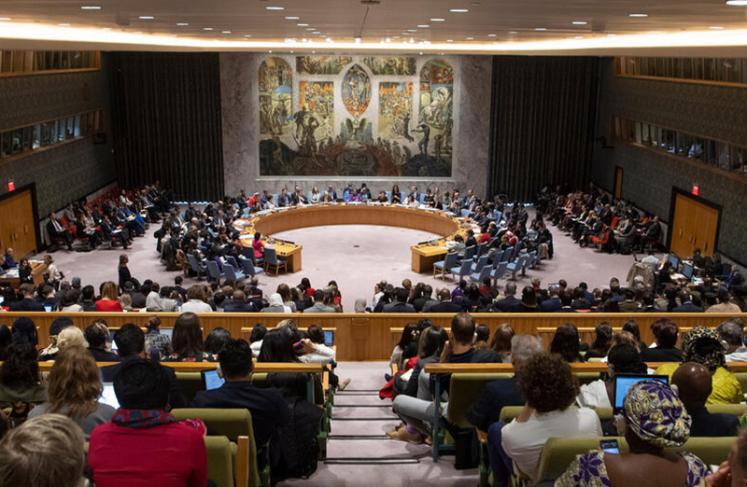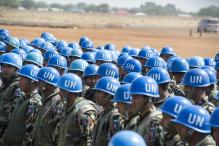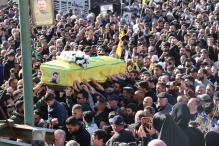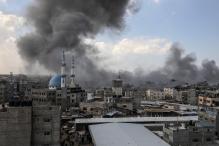As we mark International Women’s Day in the midst of a political landscape that may change the multilateral system for years to come, it is worth reflecting on how far the Women, Peace, and Security (WPS) agenda has progressed and where the gaps remain. After more than two decades of work in the UN Security Council, the focus has shifted from making progress at the norm-setting level to translating these norms into changes in the lives of women in conflict and post-conflict contexts. This requires a much more robust understanding of the scope of use and application of WPS language negotiated in Security Council resolutions on country-specific situations. Several practical and political challenges stand in the way of improving the relevance and usefulness of Council language on WPS.
To contribute to a dialogue on how to overcome such challenges, this article builds on both existing research and a select number of experiences and recommendations collected at the high-level event “From Paper to Practice: How UN Security Council Language on Women, Peace, and Security is Implemented in Conflict-affected Contexts.”
The first challenge relates to the formulation of WPS language in Council resolutions
It is now widely accepted that the Security Council should be consistent in including WPS language in its products and those texts should reflect the diverse roles of women in conflict and post-conflict transitions. Over the past four years, more than two-thirds of Security Council resolutions, on average, include WPS language, compared to only 15 percent in the five years following the adoption of resolution 1325 at the turn of the century. However, the event discussion raised the following considerations.
First, there is a need for language to be relevant to the reality of a specific country context, rather than generically recognizing WPS. Council members, when examining their multiple priorities across a given text, often turn to previously-agreed language as a way to avoid wrangling in negotiations and save their political capital for new areas where language has not been previously agreed. However, this transfer of language from one resolution to another can result in generic formulations that do not address contextual specificities. To address that challenge, the discussion suggested that language should be geared toward actions that address the ongoing situation on the ground. Such context-specific provisions should also signal the Council’s expectation that existing WPS issues be addressed and by which actors, rather than simply mentioning them as problems or areas of concern.
Second, while it is crucial that WPS language is included in resolutions, participants argued that the clarity, prioritization, and relevance of the language to a given context are key. This is supported by research that suggests that increasing the frequency of WPS references is not sufficient. Instead, UN experts and civil society should be meaningfully consulted to ensure that the language proposed is accessible and actionable to them as key stakeholders.
Third, when formulating WPS language, intersectional identities such as ethnicity, race, age, and sexual orientation were considered particularly central. That said, participants also warned against developing a common practice of making lists of such identities, as this could result in new unclear and generic WPS language.
The second challenge relates to the translation of WPS language between the global and field levels
As the Security Council operates on the highest international decision-making level, it formulates language that reflects its political and international context. However, there is a need to connect such formulations to the understanding that “clear” language can mean different things in different settings – including an understanding of what is feasible for the UN system as the target of many of the Council’s direct requests.
First, addressing this challenge requires consideration of the Council’s often abstract terminology and efforts to ensure that it is accessible to stakeholders working on relevant issues in-country. For example, the word “holistic” in resolution 2467 of 2019 did not translate well in-country - meaning that the text could have been more impactful had it been more linguistically user-friendly. The Informal Experts Group on WPS was identified as a key forum for developing an understanding of how language is implemented, including by hearing from WPS stakeholders based in-country to get their input on the clarity of certain terms.
Second, research was identified as crucial to supporting strengthened Security Council practice in closing the feedback loop between the Council itself and those UN and civil society representatives who implement its language. Specifically, qualitative analysis is essential to understanding how the Council incorporates – or does not incorporate – civil society input into its work. It is also vital to generate evidence of WPS implementation by UN and civil society stakeholders, drawn from both Security Council mandates and other sources.
The third challenge relates to working practices in the Security Council
Efforts to improve implementation face an additional challenge relating to the often very limited time available to discuss – and therefore to understand - how WPS language is used in the day-to-day work of States, UN operations, and other WPS stakeholders on the ground, and the difficulties of implementing generic language.
First, to address this challenge, there is a need to find more effective ways to hear and collect input on language from a diverse spectrum of stakeholders. To that end, the conversation at the event sought to contribute to closing the existing feedback loop between the Council, UN representatives, and civil society in New York and conflict-affected contexts.
Second, in gathering such reactions, it would be worthwhile to consider how the advice and input by women civil society briefers could be incorporated in Security Council decisions. Event participants suggested that the Council could take better advantage of the expert advice of the women from civil society that are invited to brief the Council, and ensure that they hear from them when language is being first proposed and after it has already been adopted, and get their feedback on the usefulness of the language (e.g. to compel conflict parties to ensure women’s meaningful participation in a given political process). The event discussion further underlined that there is a need for civil society briefers in the Security Council to represent the diversity of women in conflict-affected contexts. Twenty-five women civil society representatives were invited to brief the Council from 2000 to 2015. In 2021 alone, there were 60 – a huge increase. However, there is less evidence of their recommendations being incorporated into Council products.
Today, as the world watches Ukrainian women making decisions about leaving their homes or staying, only months after Afghan women were faced with a similar plight almost overnight, and while more than a dozen major crises rage on, the need to address women’s experiences of conflict and their perspectives feels even more urgent. It is important to remember that the words put on paper in New York can enable practice that changes lives in conflict contexts around the world.
This article builds on the 3 February 2022 event “From Paper to Practice: How UN Security Council Language on Women, Peace, and Security is Implemented in Conflict-affected Contexts,” hosted by The Permanent Missions of Kenya, Norway, the United States, and the United Arab Emirates, United Nations University Centre for Policy Research, UN Women, and the Peace Research Institute Oslo (PRIO). This event drew on diverse perspectives, including UN staff and civil society organizations working in Colombia, the Central African Republic, and Libya.
Suggested citation: Sophie Buddenhorn, Pablo Castillo-Diaz, Patty Chang, Cristal Downing, Louise Olsson and Sofia Rivas., "Moving From Paper To Practice on UN Security Council Language on Women, Peace, and Security in Conflict-Affected Contexts," UNU-CPR (blog), 2022-03-09, 2022, https://unu.edu/cpr/blog-post/moving-paper-practice-un-security-council-language-women-peace-and-security-conflict.





